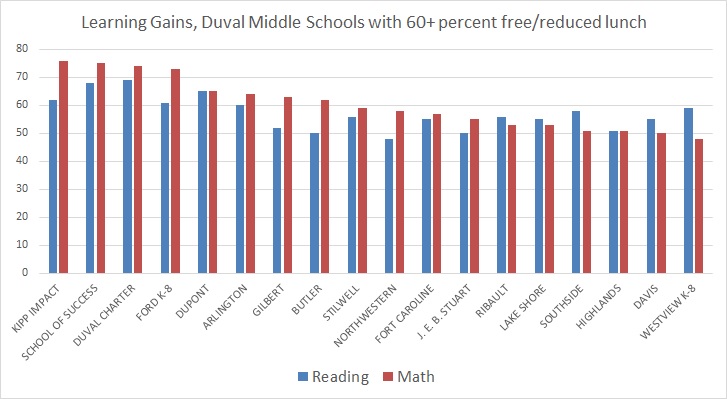Tom Majdanics tells the story of KIPP Impact Middle School in Jacksonville, Fla., in a pair of video clips. In the first, the school’s first class of fifth-graders sits in the band room, instruments at the ready, poised to play their first note.

“One, two, three, four,” the conductor says. The instruments emit a warbly burst of noise. The screen fades to black.
The second clip shows the same students four years later, an orchestra of eighth-graders rocking a concert with a pitch-perfect rendition of Outkast’s “Hey Ya.”
Florida’s first effort to bring a high-impact charter school to a high-needs neighborhood had its share of early stumbles, but it’s starting to hit the right notes.
A recently approved expansion will allow KIPP to keep growing in Jacksonville. It raised its state letter grade again this year, and its students posted some of the strongest learning gains in Duval County. Meanwhile, KIPP’s developing elementary school is expected to further boost the middle school, and it’s hoping to work more closely with the local district to spread its impact.
Majdanics, KIPP Jacksonville’s executive director, said the schools are still years from their goals, but this year more than ever, “the green shoots are unmistakable.”
The effort is worth watching from across Florida and beyond, because state policymakers are looking to duplicate it.
Gary Chartrand, a state Board of Education member, is also a board member and early supporter of the KIPP Jacksonville foundation. He’s pushing efforts to launch similar schools in other Florida cities – efforts that are set to get a boost from a new state grant program and might find additional support this year in the Legislature.
“What we’re building with KIPP in Jacksonville should be a model, I think, for other urban areas throughout Florida,” Chartrand said.
Need in Northwest Jacksonville
KIPP Jacksonville gives admissions preference to students in seven ZIP codes, a P-shaped area dotted with D and F schools.
At first, grades at KIPP’s Impact Middle School languished too, with an F in its first year and a roller-coaster ride in the years that followed. But that’s starting to change.
This year, its students boasted the second-highest learning gains in math among Duval’s middle schools. The only school that performed better had about 20 percent of its students qualify for free- and reduced-price lunches, compared to 71 percent at KIPP Impact.
Among the middle schools where 60 percent or more of students qualify for free- and reduced-price lunch, none posted larger math gains than KIPP. Reading, though, was a “tougher slog,” Majdanics said, with KIPP gains near the top but several schools ranking higher.
Kimberly Davidson, the principal at KIPP Voice Elementary School (who previously served as an administrator at the middle school), is intent on easing that slog by helping students improve their reading at a younger age. Right now, the school serves 100 students each in grades K-2. When it starts matriculating fourth graders, she said, “our students will be in a different place when they hit fifth grade at Impact.”
“For our kids to be on a college path, they’re going to need to grow at one and a half to two times the rate” of kids in typical schools, Majdanics said. The sooner the gap is addressed, the more achievable closing it becomes.
Approximately 8 percent of the poorest students in the U.S. typically graduate from college. Majdanics has adopted the slogan “eight to 80” – the school wants 80 percents of its students to finish college. When KIPP Jacksonville completes an expansion approved this year by the Duval County school board, its kindergarten class will grow to 300 students. In the Northwest Jacksonville neighborhoods KIPP targets, there are about 3,000 students in a kindergarten class. In those rough numbers, Majdanics has found a rallying cry: “It’s our aspiration to double the number of kids graduating college in Northwest Jacksonville.”

But that only counts the students within KIPP’s walls. The school wants its impact felt beyond that, by supporting Duval Superintendent Nikolai Vitti’s quest to close achievement gaps and raise graduation rates in district schools. In the past two years, the Duval district has raised its high school graduation rate faster than any of Florida’s other “big seven” urban districts. And the predominantly low-income and minority students at a district-run school of choice less than 10 minutes’ drive from KIPP are posting similarly strong learning gains.
KIPP and the district have proposed a collaboration. They’d find solutions to common problems like teacher recruitment. And they’d share knowledge as they look for ways to raise achievement among students who have historically struggled.
Proven approach
As one of the country’s largest charter school organizations, KIPP’s approach to disadvantaged students is well known. It’s been the subject of “60 Minutes” broadcasts, some entire books and significant portions of others. Researchers have probed KIPP’s results and found they can’t be explained away by things like struggling students leaving.
To make up for their disadvantages, students need more time, especially in reading. Davidson says VOICE students typically spend 190 minutes a day on reading instruction, and that’s in addition to writing and other tasks that fall under language arts. Making time for all that reading – while setting aside time for math, science, social studies, and music – requires a longer school day.
The elementary school day at KIPP starts at 8 a.m. and runs until 4:30 in the afternoon. On most days, it’s in session about two hours longer than the default school day in traditional public schools, and one hour longer than the struggling schools in Florida that added a state-mandated extra hour for reading.
While some features, like longer school days and an emphasis on college attendance, aren’t going away, teachers’ practices aren’t locked in place. Individual KIPP schools can tap the expertise of its 162 schools around the country. This has fostered a culture of experimentation on new approaches, including a recent foray into blended learning.
One November morning, first-grade teacher Melissa Hensch sat at a table with a small circle of students, who read aloud from a story about the boy who cried wolf. The remaining students sat at their desks, headphones on, working tablet computers.
They were working on programs in the eSpark software suite, which their teacher selected with help from assessments that helped identify their strengths and weaknesses. The approach allows students to focus where they need it most.
No shortcuts
Majdanics says the effort to bring the Knowledge is Power Program to Jacksonville began as the “quest of a naive graduate student” — that’d be him — and became a reality thanks to the support of people in the Duval school district and local businessmen like Chartrand.
Getting the school open required the same kind of grit the school tries to instill in its students – not to mention philanthropic backing, political juice and a few lucky breaks, including a donated facility from Jacksonville Greyhound Racing.
Some remnants of the dog track where Majdanics says he gambled in his late teens are still visible on the campus – the bleachers at the school’s auditorium, the kennels that still sit in a nearby parking lot. But the giant building has proved easy to remodel, and crucially, it has room to grow. The bare concrete walls of the building’s top floor will soon house new classrooms, and there’s space on the lot to eventually build another school building.
The question now is whether there are policies – facilities funding; state grants to entice school districts; other incentives for proven schools targeting high-needs students – that can make it easier for other school districts and other high-performing charter networks to clear the kind of hurdles that KIPP faced in Duval.
For Majdanics, opening KIPP Jacksonville and growing it into a promising model has proven the truth of another popular slogan at KIPP. It greets students and teachers in the parking lot every day: “There are no shortcuts.”



[…] Click here to read more! […]